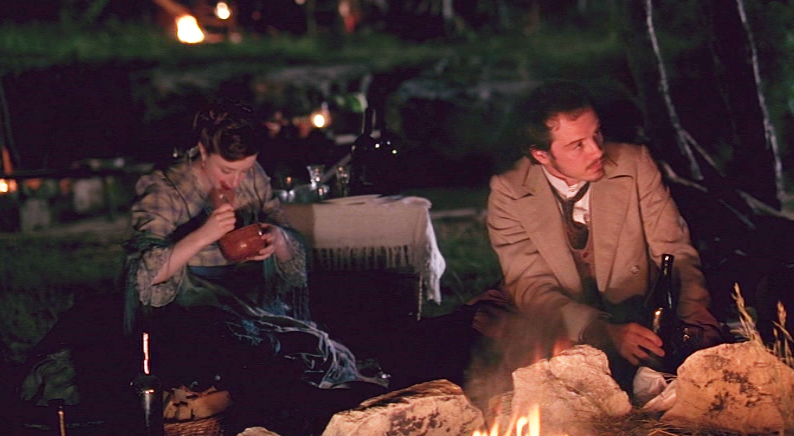Two people regard the same picnic as if from different worlds. The Deacon, a young clergyman, thinks, “My God, how nice it is! People, rocks, the fire, the twilight, a monstrous tree—nothing more, and yet how fine it is. “Laevsky, a man on the verge of a nervous breakdown, unhappy in love, deep in debt, and at odds with friends, views picnic with scorn: “How stupid and vulgar it is! I want to go to the North, to run away, to escape, but here I am, for some reason, going to this stupid picnic.”
There is an illusion of happiness necessary to a traditional picnic.” Samoylenko, with a copper-red face, was fussing round the fire just as though he were in his own kitchen, shouting furiously: “Where’s the salt, gentlemen? I bet you’ve forgotten it. Why are you all sitting about like lords while I do the work?”
Laevsky and Nikodim Alexandritch were sitting side by side on the fallen tree looking pensively at the fire. Marya Konstantinovna, Katya, and Kostya were taking the cups, saucers, and plates out of the baskets. Von Koren, with his arms folded and one foot on a stone, was standing on a bank at the very edge of the water, thinking about something. Patches of red light from the fire moved together with the shadows over the ground near the dark human figures, and quivered on the mountain, on the trees, on the bridge, on the drying-shed; on the other side the steep, scooped-out bank was all lighted up and glimmering in the stream, and the rushing turbid water broke its reflection into little bits.
The Deacon went for the fish which Kerbalay was cleaning and washing on the bank, but he stood still halfway and looked about him.
“My God, how nice it is!” he thought. “People, rocks, the fire, the twilight, a monstrous tree—nothing more, and yet how fine it is!”
Chekhov writes, The fish soup was ready by now. They were ladling it out by platefuls and eating it with the religious solemnity with which this is only done at a picnic; and everyone thought the fish soup very good, and thought that at home they had never eaten anything so nice. As is always the case at picnics, in the mass of dinner napkins, parcels, useless greasy papers fluttering in the wind, no one knew where was his glass or where his bread. They poured the wine on the carpet and on their own knees, spilt the salt, while it was dark all round them and the fire burnt more dimly, and everyone was too lazy to get up and put wood on. They all drank wine, and even gave Kostya and Katya half a glass each. Nadyezhda Fyodorovna drank one glass and then another, got a little drunk and forgot about Kirilin.
Predictably, Laevsky cannot lift his depression. “A splendid picnic, an enchanting evening,” said Laevsky, growing lively with the wine. “But I should prefer a fine winter to all this. ‘His beaver collar is silver with hoar-frost.'”
“Everyone to his taste,” observed Von Koren.
Long before they board the carriages for home, they are very drunk. At home, Laevsky complains to Nadia that she is behaving “like a . . . cocotte.”
Featured Image: Dining by firelight. Dover Kosashvili. The Duel (2010).
See Anton Chekhov. The Duel and Other Stories (1891). Translated by Constance Garnett. London: Chatto & Windus, 1916; The Duel. Translated by Richard Pevear and Larissa Volokhonsky. New York; Modern Library, 2003; Dover Kosashvili. The Duel (2010). The screenplay by Mary Bing is based on Anton Chekhov’s The Duel (1891); Iosif Kheifits. The Bad Good Man (1973). The screenplay by Kheifits is based on Anton Chekhov’s novella (1891)

